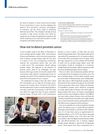 64 citations,
September 2006 in “International journal of epidemiology”
64 citations,
September 2006 in “International journal of epidemiology” Cancer development is like natural selection, involving mutated cells and environmental factors.
[object Object]  33 citations,
January 2016 in “Skin appendage disorders”
33 citations,
January 2016 in “Skin appendage disorders” The document concludes that sexual and psychiatric side effects from 5-alpha-reductase inhibitors are reported, but more high-quality research is needed to understand how often they occur.
 29 citations,
September 2014 in “Current Opinion in Endocrinology, Diabetes and Obesity”
29 citations,
September 2014 in “Current Opinion in Endocrinology, Diabetes and Obesity” Finasteride and dutasteride effectively treat hair loss in men and women, but may cause side effects like low libido and depression.
 22 citations,
October 2018 in “Aesthetic Plastic Surgery”
22 citations,
October 2018 in “Aesthetic Plastic Surgery” Understanding hair follicle biology and stem cell control could lead to new hair loss treatments.
 17 citations,
November 1997 in “Andrology”
17 citations,
November 1997 in “Andrology” Finasteride effectively treats enlarged prostate and male baldness, improves symptoms of hirsutism in women, but doesn't work for acne, and may delay prostate cancer progression with few side effects.
 11 citations,
August 2019 in “BMJ”
11 citations,
August 2019 in “BMJ” Post-finasteride syndrome causes sexual, physical, and psychological symptoms, but more research is needed to understand its causes and connection to finasteride.
 11 citations,
March 2019 in “Journal of The American Academy of Dermatology”
11 citations,
March 2019 in “Journal of The American Academy of Dermatology” Some men taking finasteride for hair loss may experience sexual problems like erectile dysfunction and decreased sex drive, which can persist even after stopping the medication.
 3 citations,
October 2020 in “Bladder cancer”
3 citations,
October 2020 in “Bladder cancer” 5α-reductase inhibitors don't stop bladder cancer from developing or getting worse.
 3 citations,
August 2020 in “Urology Journal”
3 citations,
August 2020 in “Urology Journal” Using 5-alpha reductase inhibitors may increase the risk of mild depression.
 August 2012 in “Pharmaceutical Medicine”
August 2012 in “Pharmaceutical Medicine” The document concludes that various medications and treatments can have significant, sometimes adverse, effects on health outcomes.
1 citations,
January 2018 in “Advances in cancer prevention” Preventing cancer involves lifestyle changes, vaccinations, early screening, and understanding cancer's molecular basis.
 30 citations,
January 2023 in “EFSA journal”
30 citations,
January 2023 in “EFSA journal” Adults should not consume more than 255 micrograms of selenium per day to avoid risk of hair loss and other side effects.
23 citations,
January 2016 in “Frontiers in immunology” Using low-dose IL-2 to increase regulatory T cells might be a safe way to treat type 1 diabetes without severe side effects.
1 citations,
October 2023 in “Journal of personalized medicine” Food intake, not genetics, affects how the body processes tadalafil and finasteride.
1 citations,
January 2018 in “Molecular and integrative toxicology” Getting the right amount of selenium is important for health; too little can cause disease, and too much can lead to toxicity.
70 citations,
September 2017 in “Expert opinion on therapeutic patents” The review suggests that while many AKR1C3 inhibitors show promise for treating certain cancers, more research is needed to confirm their effectiveness in humans.
May 2023 in “Clinical, Cosmetic and Investigational Dermatology” More personalized and effective treatments for androgenetic alopecia are needed.
 March 2023 in “Translational Andrology and Urology”
March 2023 in “Translational Andrology and Urology” 5-alpha reductase inhibitors, like finasteride and dutasteride, are used for prostate issues, hair loss, and excessive hair growth, may help with COVID-19, but can cause sexual and mental health side effects, and their use in preventing prostate cancer needs more examination.
 1 citations,
October 2006 in “Oncology times”
1 citations,
October 2006 in “Oncology times” Finasteride improves prostate cancer detection in PSA test.
 February 2007 in “Lancet Oncology”
February 2007 in “Lancet Oncology” Using a single PSA level to decide on a prostate biopsy is not effective; a more personalized approach considering various factors is recommended.
 12 citations,
October 2013 in “The Prostate”
12 citations,
October 2013 in “The Prostate” Dutasteride and finasteride affect different cell types differently.
 3 citations,
March 2005 in “The Journal of urology/The journal of urology”
3 citations,
March 2005 in “The Journal of urology/The journal of urology” Dutasteride may help shrink prostate cancer tumors.
 1 citations,
January 2020 in “Skin appendage disorders”
1 citations,
January 2020 in “Skin appendage disorders” Finasteride is safe for hair loss treatment and doesn't increase high-grade prostate cancer risk.
 October 2015 in “Elsevier eBooks”
October 2015 in “Elsevier eBooks” Finasteride helps hair growth and prostate issues but may cause sexual side effects and increase tumor risk.
 22 citations,
October 2018 in “British Journal of Haematology”
22 citations,
October 2018 in “British Journal of Haematology” Women have a higher risk of blood clots from hormonal factors and need careful treatment, especially during pregnancy.
[object Object]  20 citations,
May 2011 in “Cancer Biology & Therapy”
20 citations,
May 2011 in “Cancer Biology & Therapy” Finasteride may improve prostate cancer treatment outcomes.
 18 citations,
July 2009 in “Drug Metabolism and Disposition”
18 citations,
July 2009 in “Drug Metabolism and Disposition” Finasteride breakdown products found in bile and urine, helps understand drug safety and effectiveness.
 14 citations,
May 2011 in “Drug Metabolism and Disposition”
14 citations,
May 2011 in “Drug Metabolism and Disposition” Ketoconazole increases finasteride's effectiveness and lifespan in the body.
 9 citations,
October 2013 in “PLOS ONE”
9 citations,
October 2013 in “PLOS ONE” Dutasteride works better than finasteride for preventing and treating prostate cancer.
 8 citations,
December 2016 in “Revista Medica De Chile”
8 citations,
December 2016 in “Revista Medica De Chile” Finasteride can cause sexual dysfunction, sperm changes, and affect bone density and metabolism.
























